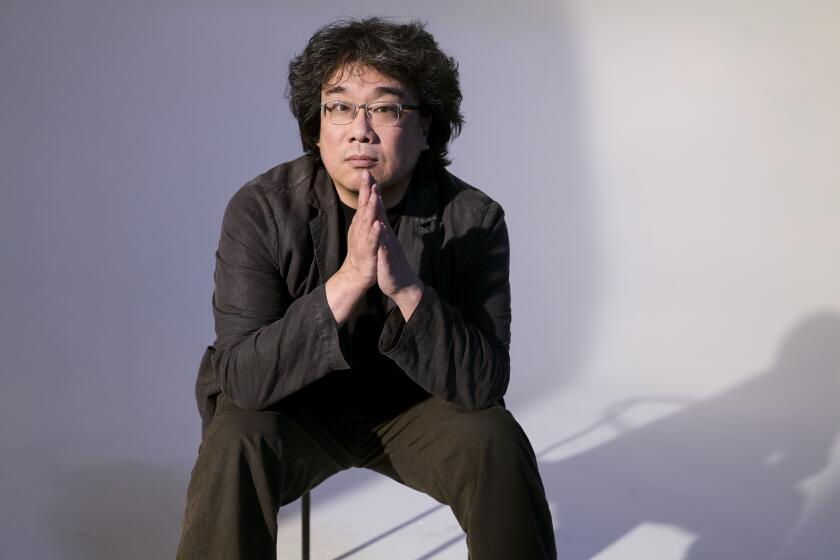A Strange Love for a Maverick of the Cinema
- Share via
I heard he had died, getting the news from a this-just-in news flash on TV. It hit me in a strange way. I found myself feeling his demise personally over the last couple of days, as though having just lost an important cult figure from my youth, a towering idol.
Everything about him, I’d admired.
He had let his greatness speak for itself--not that shyness or aloofness is a virtue--in a way that suggested he didn’t hold the world in contempt, but rather just preferred to be known for his achievements and not for his ability (or availability) to discuss them.
He had remained at a distance, as far as politely possible from the flashing bulbs and spotlight beams commonly associated with a glamorous profession. A gap only a Garbo could love was maintained between himself and all the thousands of prying eyes of those who seem to see and know every detail of every celebrity’s business.
He moved at his own pace, agreeing to do nothing until he was good and ready.
His greatest work? Decades ago, yet it still stood the test of time, preserved on film to evoke unforgettable imagery.
Joe DiMaggio?
No.
Stanley Kubrick.
*
Waiting for a new motion picture from Kubrick, the painstaking director who died Sunday at 70, was anguish for those of us who could count on a Steven Spielberg or a Woody Allen to crank out reels of film faster than a projectionist on caffeine.
For me, it was like anticipating a new work from the author Thomas Harris, who wrote the 1980s psychological thriller “The Silence of the Lambs,” but to the best of my knowledge, hasn’t published a book since. (Whereas, say, Stephen King continues to proliferate reams of horror as fast as his 10 or 12 fingers can type.)
Tortoises versus hares.
I remember walking up the aisle toward an exit after seeing “Full Metal Jacket,” the 1987 Kubrick film, humming along with the Rolling Stones’ “Paint It Black” while the end credits rolled, wondering what Kubrick would come up with next.
I’m still waiting.
He made 13 films. The first--”Fear and Desire,” of which I know nothing--was made in 1953. His last, “Eyes Wide Shut,” which co-stars Tom Cruise and Nicole Kidman, is due out in July. I can tell you two things about it, thanks to its advance publicity: It’s a movie, and theaters are expected to sell popcorn.
Otherwise, Kubrick kept a lid on everything. We knew about sharks, dinosaurs and extraterrestrials long before Spielberg’s films showed them to us. Kubrick disclosed information as if guarding government secrets. He was the invisible director. After 43 years of filmmaking, I couldn’t have recognized Kubrick on the street. Compared to him, Joe DiMaggio was a gadabout.
“2001” was the ultimate for some.
Now that it practically IS 2001, the film is not so mind-blowing. But circa 1968, believe me, Kubrick’s version of Arthur Clarke’s visionary “2001: A Space Odyssey” was like a hallucinatory head trip. I wasn’t even sure it was good. I just remember seeing the monolith and the embryo and leaving the theater wondering, “What in the hell was THAT?”
(I have also said this after many other films, but for a different reason.)
Were he a man who made nothing but weird, indecipherable films, Kubrick would probably not have the same appeal. And once the eerie “A Clockwork Orange” came out in 1971, audiences had reason to begin labeling Kubrick a maker of avant-garde film, which is French for “What in the hell was THAT?”
But this was, after all, the director of “Spartacus,” a spectacle about the honor of doing battle, and “Paths of Glory,” about its dishonor. And before this he made “The Killing,” a non-spectacle, filmed in 1956 on a budget of $320,000, which today wouldn’t pay for Bruce Willis’ hairstylist.
*
A few years ago, a new print of 1964’s “Dr. Strangelove” was released, with an enhanced sound and picture. I went to the Nuart to see it, in a packed house.
We laughed at President Merkin Muffley, Group Capt. Lionel Mandrake and Dr. Strangelove himself, all of whom happened to be Peter Sellers. We laughed at George C. Scott, who, forget “Patton,” was never better. And we laughed at Slim Pickens, straddling that bomb, a-yellin’ and yahooin’.
I told a guy in the lobby, “Man, Kubrick’s the best.”
“Which one was he?” the guy asked.
He must have watched it with his eyes wide shut.
Mike Downey’s column appears Sundays, Wednesdays and Fridays. Write to him at Times Mirror Square, Los Angeles 90053. E-mail: [email protected]
More to Read
Only good movies
Get the Indie Focus newsletter, Mark Olsen's weekly guide to the world of cinema.
You may occasionally receive promotional content from the Los Angeles Times.










